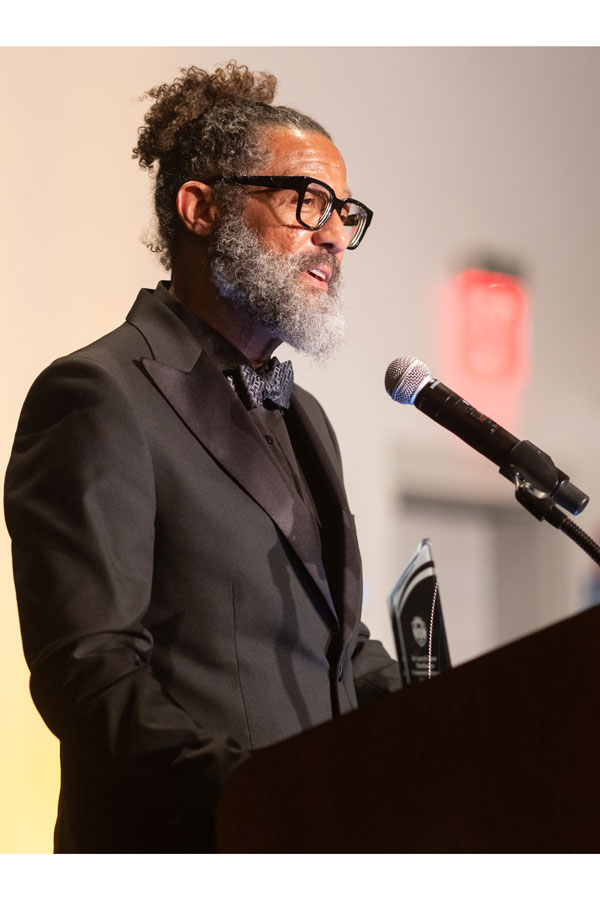Gaskew receives award for engaged scholarship
Other faculty publish on history, environmental science and more

University of Pittsburgh at Bradford faculty have spent the fall publishing and presenting their research, and one was honored for his scholarship.
Dr. Tony Gaskew, professor of criminal justice and associate dean of academic affairs, received the Larry E. Davis Excellence in Community Engaged Scholarship Award from the University of Pittsburgh last week.
Gaskew received the award at a dinner at the Heinz History Center in Pittsburgh. He was recognized for his extraordinary contributions to the understanding of Black male studies and criminal justice through his pioneering research, including the creation of the FBI-COINTELPRO (Counter Intelligence Program) Pittsburgh Collection and his leadership of the Prison Education Program at Pitt-Bradford.
The FBI-COINTELPRO Pittsburgh Collection is a special digital archive of the FBI’s counterintelligence operations targeting the 1960s Black Power Movement in Pittsburgh. As a scholar in Black male studies, counterinsurgency and killology, he has authored more than 50 publications, including three books, on the systemic impact of policing on the Black male experience in the United States.
His two most recent journal publications, “The United States of America v. Darren Seals” and “How to Become a Soldier in the Black Liberation Army: Sixteen Tomes,” chronicle the two-year covert FBI surveillance operation of a murdered civil rights activist from Ferguson, Mo., and a historiography of the books read by members of the Black Liberation Army at the height of their revolutionary justice activities in the 1970s.
He is a Fulbright Hays Scholar and a FDD Terrorist Fellow, who has conducted ethnographic research across Egypt and the Palestinian Territories.
In other faculty activity, Dr. Drew Flanagan, an assistant professor of history, has published a chapter in the new book “Soft Power beyond the Nation” by Georgetown University Press. His chapter, “A Universal Mission: The Folklore and Propaganda of Robert Boutet Between Morocco and Occupied Germany, 1931-1949,” examines the life of Robert Boutet, a French folklorist. Boutet created a way to use ethnological research to author folk stories that aimed to subtly encourage French-speaking Moroccan youth to support anti-paganism. Later, he served in the French army during its occupation of Germany and applied the same techniques to help shape German society after World War II.
Additionally, Flanagan presented a paper, “Defending the Frontiers of the French Union: Promoting Empire and Western Identity in the French Zone of Occupied Germany, 1946-55,” at the Society for Military History Conference in Arlington, Va.
Dr. Femi Oloye, assistant professor of chemistry, was invited to lecture at the International Conference on Advanced Materials and Applied Sciences. He also was an author on a paper published with collaborators from the University of Saskatchewan, Canada. The paper dove into the critical need for cost-effective, rapid and reliable technologies for wastewater surveillance systems, particularly for monitoring community levels of the virus that causes COVID-19.
Dr. Ovidiu Frantescu, associate professor of environmental science, collaborated on a publication in Treatise Online describing the form and shape of decapods, an order of crustaceans that includes crabs, lobsters, crayfish, shrimp and prawns.
He also worked with fellow Pitt-Bradford faculty Dr. Julia Morgan, assistant professor of philosophy; Dr. John Sebastiani, visiting instructor of biology; and Dr. Mary Mulcahy, associate professor of biology, to publish a module of related activities to help high school ecology teachers explain concepts of climate change.
Dr. Patricia Lanzon, associate professor of education, worked with Amanda Davis, visiting assistant professor of health and physical education, and Jodi Burns, former assistant professor of sport and recreation management, to publish an article in the Fall 2024 Pennsylvania Teacher Education Journal about the alignment of the Pitt-Bradford education program’s annual Family Literacy Day with the Pennsylvania family and community engagement standards for schools.
Librarian Catherine Baldwin published an article in Public Services Quarterly, “Utilizing Microsoft OneNote as a research project management tool for undergraduate student instruction.”
--30--